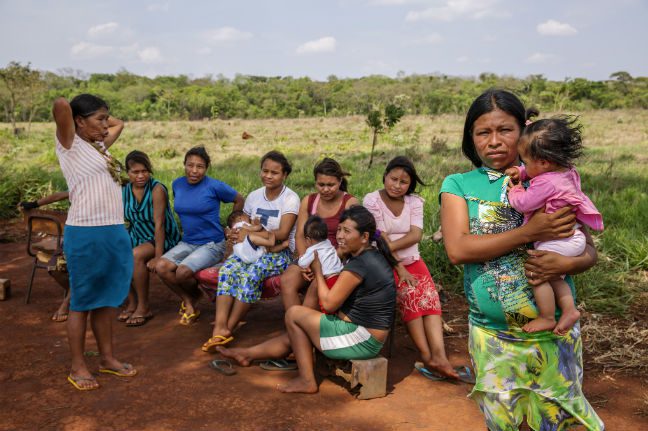Communities unfairly forced off their land are plunged into poverty. They often face the threat of violence for speaking out as well as food shortages, inadequate housing and poor health.
Last year Oxfam Australia released the Banking on Shaky Ground report that detailed how Australia’s four biggest banks – ANZ, Commonwealth Bank, Westpac and NAB – are backing companies linked to agricultural land grabs overseas.
In the year that’s passed since the release of our report, Australian customers and investors have shown they care deeply that their bank respects land rights:
- 20,000 Australians have signed Oxfam’s petition calling for the banks to take action,
- Bank customers have sent 10,000 letters to their banks,
- Another 3,000 signalled that action on land grabs could shape their future banking decisions,
- Shareholders have raised their concerns at the highest level.
- Australians have added their voices in support of community land rights defenders in PNG, Cambodia, Brazil and other countries.
What is Oxfam calling for?
Oxfam is calling for the banks to commit to Zero Tolerance for Land Grabs. This involves:
- being more transparent about their links to agriculture land deals,
- committing to increased due diligence
- advocating responsible financing
- supporting justice for affected communities
What have the banks done?
So far no bank has adopted Zero Tolerance for Land Grabs, until they do this they risk using our money to support land grabs overseas. All four banks need to do more to increase their transparency and support for affected communities. That said, some banks have recognised the risk of land grabs to their business and to communities more than others.
NAB
National Australia Bank was the first bank to act, announcing in June that it would put out a policy statement on land grabs later that year. In November it released its Policy Statement on Improper Land Acquisitions which outlines what the bank will do to respect land rights based on its existing human rights commitments. Although these measures do not go far enough – they are a good first step.
Westpac
The following week, Westpac released a new Financing Agribusiness policy. Significantly, the bank has committed to only lending to agribusiness companies that respect all communities rights to make decisions about their land — a standard known as Free, Prior and Informed Consent.
These steps clearly place NAB and Westpac ahead of ANZ and the Commonwealth Bank.
CBA
A year ago, Commonwealth Bank lagged behind its competitors on its environmental and social responsibility policies. The bank has shown a willingness to engage on one case in Brazil, but it has not made any commitments to improve its practices bank-wide.
ANZ
ANZ has also failed to take any systemic action on land grabs. ANZ’s response to Oxfam’s detailed evidence of links to 10 additional land grabs cases was to deny any connection without presenting any information to support its claims.
ANZ has only responded publicly to a single case involving a loan to Cambodian company Phnom Penh Sugar (PPS) — a case first reported by Fairfax journalists in January 2014. In July ANZ and PPS ended their financing relationship. Yet, ANZ has insisted on keeping its profits from the deal despite knowing that they are linked to child labour, food shortages and forced evictions.
The community continues to face day-to-day hardship as a result of losing their land, although ANZ has made misleading claims about ‘compensation’ or other processes that suggest otherwise.
Land grabs are not only bad for people, they’re also bad for business.
One year on…
In just 12 months we’ve had some unprecedented wins. While this is a great start, no bank has committed to zero tolerance for land grabs – which means that they continue to place communities, and our money, at risk.
In 2015, we will be ramping up the pressure on the banks to take a zero tolerance to land grabs.
We will keep working with Australian bank customers, responsible investors and affected communities to grow a movement for better banks that respect all communities’ land rights.




